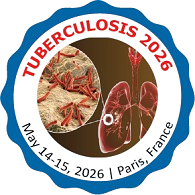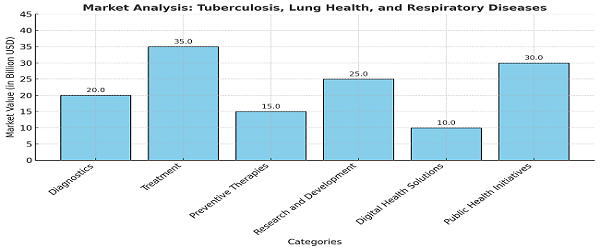Innovations in Tuberculosis Diagnosis and Treatment
This track explores breakthroughs in diagnosing and treating tuberculosis (TB), including rapid molecular diagnostics, new antibiotics, and shorter treatment regimens. Discussions will address challenges in managing multidrug-resistant TB (MDR-TB) and highlight global efforts to improve treatment adherence. Attendees will gain insights into emerging prevention strategies and vaccine developments aimed at reducing TB prevalence worldwide.
Advances in Lung Health and Respiratory Care
This session focuses on advances in lung health, covering chronic respiratory diseases like COPD, asthma, and pulmonary fibrosis. Experts will discuss innovations in early diagnosis, personalized treatment, and pulmonary rehabilitation techniques. Attendees will explore the impact of environmental factors and lifestyle changes on lung health and preventive care approaches.
Respiratory Infections: Global Challenges and Solutions
This track examines the global burden of respiratory infections, including TB, pneumonia, and influenza. Topics include antimicrobial resistance, outbreak control, and novel treatment approaches. Attendees will learn about public health initiatives, vaccine developments, and strategies to mitigate the spread of infectious respiratory diseases worldwide.
Pulmonary Rehabilitation and Holistic Approaches
This session highlights pulmonary rehabilitation and holistic care for chronic respiratory conditions. Experts will present strategies combining exercise, education, and emotional support to improve patients’ quality of life. Discussions will also explore integrating mindfulness, breathing techniques, and complementary therapies to enhance respiratory health.
Combating Multidrug-Resistant Tuberculosis (MDR-TB)
This track focuses on tackling multidrug-resistant tuberculosis (MDR-TB) through innovative therapies and global health interventions. Attendees will explore drug resistance mechanisms, challenges in treatment adherence, and promising new drug combinations. Discussions will highlight ongoing initiatives aimed at controlling MDR-TB and improving patient outcomes.
Integrated Healthcare Approach:
Developing synergistic collaborations between TB programs and other health services ensures streamlined, patient-centered care. Such integration enhances outcomes for co-morbid conditions like HIV/AIDS, diabetes, and maternal health. Addressing tuberculosis alongside other diseases helps create a holistic healthcare system that prioritizes the overall well-being of individuals.
Early Detection and Diagnosis:
Timely identification of TB cases reduces transmission and enables earlier treatment. Scaling up rapid diagnostic tools in resource-limited settings is key to achieving this goal. Innovations such as molecular tests and portable X-ray systems can improve early detection, especially in underserved areas.
Treatment Adherence and Support:
Adherence-focused programs, including digital adherence tools and peer support groups, improve treatment completion rates. Empowering patients through education fosters better engagement and outcomes. Adequate psychosocial and financial support further ensures that patients remain consistent with their treatments.
Preventive Therapy:
Prophylactic interventions can significantly reduce the risk of active TB among vulnerable groups. Scaling these programs in high-risk populations ensures proactive TB control. Targeted preventive measures for household contacts and individuals with latent TB infection are essential to interrupting transmission chains.
Vaccination Programs:
Enhancing access to the BCG vaccine for children in high-burden regions remains a cornerstone of TB prevention. Research on next-generation vaccines is vital for long-term control. Improved vaccine strategies can help curb severe forms of TB and enhance immunity in populations at risk.
Addressing Social Determinants of Health:
Socioeconomic improvements, such as housing and income support, mitigate TB risk factors. Holistic policies addressing inequality bolster health outcomes for disadvantaged populations. By tackling poverty, overcrowding, and limited access to healthcare, we can significantly reduce TB incidence.
Infection Control Measures:
Strengthening infection control protocols in healthcare and community settings is critical. Training healthcare workers and ensuring proper infrastructure reduce nosocomial transmission. Simple interventions like proper ventilation and early screening in high-risk environments can have a profound impact.
Research and Innovation:
Investing in breakthroughs like shorter TB treatment regimens accelerates global control efforts. Collaboration between public and private sectors drives innovation and implementation. Ongoing studies on new vaccines, drugs, and diagnostics are essential to overcoming current challenges in TB management.
TB-HIV Co-Infection:
Integrated care models improve outcomes for individuals with both conditions. Scaling up access to antiretroviral therapy alongside TB treatment is essential in high-burden areas. Coordinated efforts between TB and HIV programs can significantly enhance survival rates.
Drug-Resistant Tuberculosis:
Efforts to curb drug-resistant TB must focus on faster diagnostics and effective second-line therapies. Global surveillance and containment strategies are paramount to stopping its spread. Addressing MDR-TB and XDR-TB requires substantial investment in patient-centered approaches and innovative drug formulations.
Pediatric Tuberculosis:
Enhancing diagnostic techniques tailored for children ensures earlier interventions. Child-friendly treatment regimens can improve adherence and outcomes for young patients. Pediatric TB research and care models must consider unique clinical challenges like co-infections and nutritional needs.
Tuberculosis in Vulnerable Populations:
Removing barriers to care through tailored outreach programs is crucial. Community-based approaches can address stigma and provide much-needed resources. Ensuring equitable access to treatment for migrants, refugees, and homeless populations is vital for effective TB control.
One Health Approach to TB Control:
Understanding zoonotic TB transmission requires collaboration across human, animal, and environmental health sectors. Targeted interventions can address shared risk factors in vulnerable regions. This approach highlights the interconnectedness of TB across species and ecosystems.
Nutrition and Tuberculosis:
Nutritional supplementation supports immune function during TB treatment. Addressing malnutrition reduces disease susceptibility and accelerates recovery. Policies focusing on food security and supplementation can drastically improve treatment outcomes.
Tuberculosis and Non-Communicable Diseases:
Screening for NCDs in TB patients can uncover underlying risk factors. Integrated care models reduce morbidity and improve quality of life. Addressing the bidirectional relationship between TB and conditions like diabetes is crucial for holistic care.
Mental Health and Tuberculosis:
Psychosocial support reduces anxiety and depression associated with TB. Incorporating mental health interventions improves treatment adherence and overall well-being. Community mental health programs can alleviate stigma and provide a safety net for patients.
Gender and Tuberculosis:
Addressing gender-specific barriers to TB care enhances access and outcomes. Policies tailored to women and men ensure equitable disease management strategies. Understanding gender disparities helps design more inclusive and effective healthcare initiatives.
Ethical Considerations in TB Research and Control:
Ethical frameworks ensure that interventions respect participant rights and community norms. Transparency in research fosters trust and equitable benefit distribution. Ensuring informed consent and confidentiality in TB studies is critical for ethical compliance.
Digital Health Solutions for TB Control:
Mobile apps and telehealth platforms streamline patient monitoring and follow-up. Digital tools enable real-time data collection to enhance TB surveillance and response. These technologies offer innovative solutions to overcome logistical and geographical barriers.
TB Advocacy and Community Engagement:
Community-driven campaigns help reduce stigma and increase health-seeking behavior. Engaging local voices ensures programs are culturally sensitive and impactful. Advocacy efforts can also foster political will and resource allocation for TB initiatives.
Tuberculosis Prevention and Global Public Health Strategies
This track focuses on TB prevention and global public health strategies to reduce infection rates. Experts will discuss vaccination updates, screening methods, and early intervention programs. Attendees will explore the role of public health policies, education, and community-based initiatives in preventing the spread of TB, with insights into improving access to care in vulnerable populations.
Novel Therapies and Drug Development for Tuberculosis
This session highlights new therapies and drug development for treating TB and multidrug-resistant TB (MDR-TB). Discussions will cover promising antibiotics, shorter treatment regimens, and innovative drug combinations. Attendees will gain insights into the latest clinical trials and the challenges of developing cost-effective, accessible TB treatments worldwide.
Early Diagnosis and Biomarkers in Respiratory Diseases
This track explores the role of biomarkers and diagnostic tools in the early detection of respiratory diseases, including TB, COPD, and asthma. Experts will discuss advancements in molecular diagnostics, imaging technologies, and predictive biomarkers. Attendees will gain insights into improving early diagnosis to enhance patient outcomes and reduce healthcare burdens.
Pediatric Tuberculosis and Respiratory Health
This session addresses the unique challenges of pediatric TB and respiratory diseases. Topics include early diagnosis, tailored treatment regimens, and preventive measures for children. Attendees will explore current research, guidelines, and strategies to improve pediatric respiratory health outcomes and reduce childhood TB transmission rates.
Impact of Smoking and Environmental Factors on Lung Health
This track examines the impact of smoking, pollution, and environmental factors on lung health and the development of respiratory diseases. Experts will discuss strategies for reducing exposure to harmful pollutants and promoting smoking cessation. Attendees will gain knowledge of policy-level interventions and community initiatives to protect lung health.
Latent Tuberculosis: Diagnosis, Treatment, and Control
This track focuses on managing latent tuberculosis (LTBI), exploring innovative diagnostic tools, preventive therapies, and public health strategies. Discussions will include identifying high-risk populations, enhancing treatment adherence, and integrating LTBI management into routine healthcare systems. Attendees will gain insights into global initiatives aimed at reducing TB reactivation rates.
Global Efforts to Eliminate Tuberculosis by 2030
This session highlights global initiatives, such as the End TB Strategy, aimed at eliminating TB by 2030. Experts will discuss progress, challenges, and innovative approaches to accelerate TB control efforts worldwide. Attendees will explore policy-level changes, resource mobilization, and technological advancements driving these efforts.
Role of Artificial Intelligence in Tuberculosis Diagnosis
This track explores the application of artificial intelligence (AI) and machine learning in TB diagnosis and treatment monitoring. Discussions will cover AI-powered radiological imaging, predictive analytics, and automated diagnostic tools. Attendees will learn how AI improves diagnostic accuracy and enhances decision-making in TB management.
Hospital-acquired Infections and Respiratory Care
This session examines the prevention and management of hospital-acquired respiratory infections, including ventilator-associated pneumonia and nosocomial TB. Experts will discuss infection control protocols, antimicrobial stewardship, and innovative technologies to minimize transmission risks in healthcare settings.
Tuberculosis and HIV Co-infection: Challenges and Treatment
This track addresses the complex interplay between TB and HIV co-infection, emphasizing diagnostic challenges, treatment complexities, and prevention strategies. Attendees will gain insights into integrating TB-HIV care, improving treatment adherence, and reducing mortality in co-infected populations.
Emerging Respiratory Threats and Pandemic Preparedness
This session focuses on emerging respiratory threats, including novel coronaviruses, drug-resistant pathogens, and airborne infections. Discussions will highlight strategies for pandemic preparedness, rapid response, and global surveillance to mitigate future respiratory health crises.
Genetics and Susceptibility to Tuberculosis and Lung Diseases
This track explores the role of genetics in determining susceptibility to TB and other respiratory diseases. Experts will discuss genetic variations that influence immune responses and disease progression. Attendees will learn about personalized treatment approaches and implications for precision medicine.
Digital Health Technologies for Respiratory Disease Management
This session delves into the use of digital health technologies for managing TB and other respiratory conditions. Topics include telemedicine, mobile health apps, and remote monitoring tools. Attendees will explore how digital innovations enhance patient engagement, treatment adherence, and disease management.
Neonatal and Maternal Respiratory Health
This track focuses on respiratory health in newborns and mothers, addressing risk factors, early detection, and preventive care. Discussions will include strategies for managing perinatal infections, neonatal respiratory distress, and maternal TB to improve outcomes for both mother and child.
Community-based Approaches to TB and Lung Health Awareness
This session highlights community-based approaches to raising awareness and promoting early detection of TB and respiratory diseases. Topics include community health education, engagement strategies, and culturally sensitive interventions aimed at empowering communities to take charge of their health.




